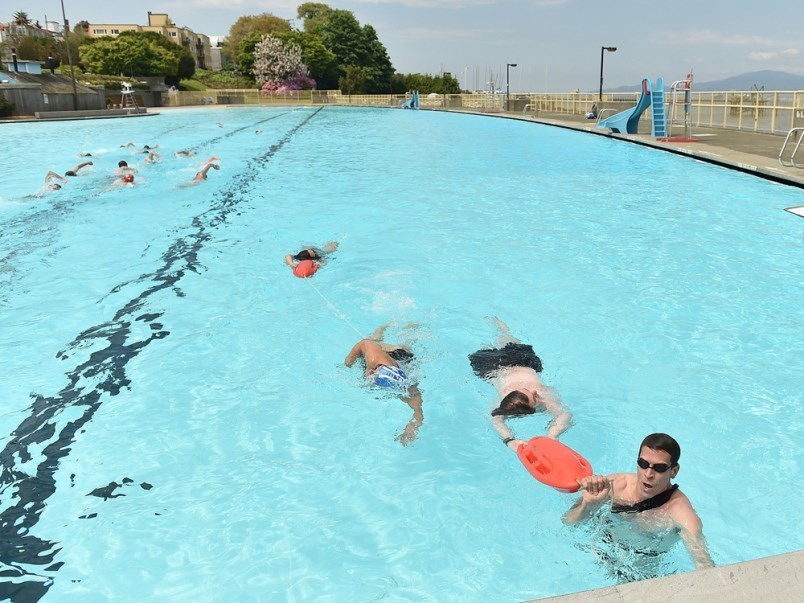String bikinis are in.
Jeans and sweatpants are out.
So is any swimwear that exposes a person’s genitals.
One more thing: anyone who wants to swim topless can do so.
That is a summary of a new policy park board commissioners approved 6-1 Monday that sets guidelines on what is considered “appropriate” attire for people to wear when swimming at a City of Vancouver pool.
The policy will be in effect for at least one year and will be reviewed at the end of the trial.
“The bottom line of what is proposed in this policy includes a requirement to ensure genitals are not exposed in alignment with criminal laws around nudity,” said Steve Kellock, the park board’s director of recreation, in a presentation prior to the vote.
“The proposed policy does not require tops to be worn by anyone attending an aquatic facility, as being topless does not offend laws of nudity and is a protected ground with precedents under Supreme Court rulings.”
Commissioners heard from staff that the need for an appropriate swimwear policy was driven by concerns from lifeguards and other aquatic facility workers about how to respond to people who show up to swim in inappropriate gear.
A staff report defined that gear as “items designed for sexual/intimate purposes,” clothing which absorbs water and becomes heavy such as jeans or sweatpants, and attire with long or flowing fabric that may limit movement or cause a safety risk.
'Cheeks of the buttocks'
Comm. Tom Digby said there was confusion reported in the media about whether string bikinis were allowed under the policy, and asked staff to clarify — to which Peter Fox, the park board’s manager of recreation services, provided this response: “The policy speaks to full coverage of the genital area. We do have patrons that do wear string bikinis, thong bottoms and so on with the cheeks of the buttocks exposed. That's not a problem, as long as the genital area is covered.”
Comm. Marie-Claire Howard asked staff how many incidents of “improperly exposed genitals” have occurred at pools over the past year. Fox said he would have to get back to Howard with details, but added “there have been a number of occasions.”
Howard: “So it’s more than one or two?”
Fox: “Oh yes, yes.”
The staff report defined appropriate as “what other Canadians find as an acceptable level of tolerance in a family public swimming environment that includes maintaining full and appropriate coverage of genitals.”
That includes a bathing suit, swim trunks, board shorts, T-shirts, shorts, a burkini, swim hijab, leggings and tunic, a rash guard and wetsuit, according to the staff report, which also states reusable or disposable swim diapers or pants are to be worn by individuals without sufficient control of their bladder, or bowel.
Disposable swimsuits
Commissioners heard from residents concerned the policy would exclude some swimmers.
Margery Duda of the Vancouver Society for the Promotion of Outdoor Pools said not everyone can afford a swimsuit and people may still show up in their street clothes to swim. Duda suggested the park board consider making disposable swimsuits available.
“We're hoping this policy presents opportunities to reduce rather than increase barriers to using our aquatic facilities and to make swimming more accessible to all,” said Duda, noting there is a Canadian company that supplies several major hotels and spas for guests who don't have swimsuits.
A person who identified themselves as a transgendered person told commissioners she was worried that she would now have to wear swimwear that didn’t align with her gender — and that the policy will serve as another tool to oppress minority groups.
Kellock, who noted there is an existing two-spirit, trans and gender diverse swim, emphasized training will be part of the new policy “to ensure that we aren't adding any barriers to participation.”
In his closing comments, Digby encouraged all Vancouverites to use the pools.
“Body positivity is a core value certainly for me and my family and the people I represent,” he said.
“For the people in the room, we want you all to bring your whole selves to our swimming pools. This is Vancouver, we're out and we're proud. And we want you to be all there and not to be worried about how you might look or how someone might feel about that.”

